
If you’re considering opening an eCommerce business, but don’t know where to begin or need some inspiring business ideas, you’ve come to the right place.
eCommerce has experienced a massive surge in recent years, with global online retail sales reaching $1.5 trillion in 2015 and growing to $4.8 trillion in 2021. This upward trend is expected to continue, presenting lucrative opportunities for business owners like you.
This blog is designed for aspiring entrepreneurs eager to explore eCommerce, and offers valuable insights, practical tips, and inspiring ideas to kickstart your online business journey. Comrade Digital Marketing, with its extensive experience in the eCommerce industry, is here to support you every step of the way.
Get ready to dive into the world of eCommerce, uncover the secrets to success, and establish a thriving online business. Let’s begin this exciting journey together!
Start Your Ecommerce Business with a Website
The (not so) new way to shop is online, so eCommerce stores are especially advantageous to small store owners looking to expand their reach and brick-and-mortar stores who want to carve out their market share online.
Of course, there are some challenges to having an online store. For example, you need to make sure that your website is secure, that you have a good shipping and returns policy, and that your website is easy to use and navigate.
However, there are quite a few reasons why you might want to have your business online:
- a wider audience: an online ecommerce business can reach people all over the world, while a physical store is limited to the people who live in your area.
- increase sales: Online stores are often more convenient for customers; an online store is always open, so customers can shop 24/7.
- reduce costs: for eCommerce store owners, operating online can be less expensive than operating a physical store, as you don’t have to pay for rent, utilities, and other overhead costs.
- collect data to adjust marketing efforts: An online store can collect data about your prospective customers, such as their demographics, interests, and purchase history. This data can be used to improve your marketing campaigns and target your products to the right people.
Comrade Digital Marketing Agency can help you with the above if you’re unsure how to go about it. Schedule a free consultation.
Delivering Business Results: Our Digital Marketing Case Studies
Overall, the benefits of having an online e-commerce store outweigh the challenges. If you are looking to grow your business and reach a wider audience, then an online business is a great option.
How Do I Start an Online Store?
Starting an online e-commerce business is similar to opening a physical store, except it’s digital. In general, before you sell products, you’ll want to:
- Research and study eCommerce business industry trends.
- Choose your eCommerce niche
- Conduct competitive research
- Determine your target audience
- Define Budget and Resource Research
- Decide on a business model
- Develop a business plan
Now let’s break it into some easy steps.
From Concept to Cashflow: How to Start an Ecommerce Business from Scratch in 7 Steps
1. Research Ecommerce Business Industry Trends
The global e-commerce market is expected to reach $6.5 trillion by 2023. This growth is being driven by a number of factors, including the increasing popularity of smartphones, the growing middle class in developing countries, and the convenience of online shopping.
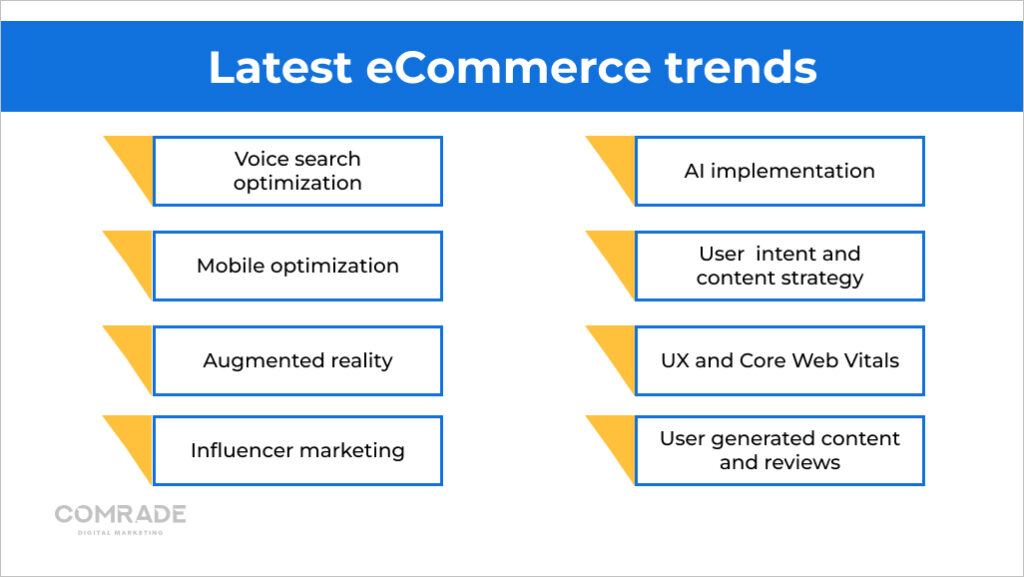
Ecommerce trends drive consumer behavior, boost online sales, and shape future retail landscapes
As the e-commerce industry continues to grow, it is important for eCommerce entrepreneurs to stay up-to-date on the latest trends. Some of the most important trends to watch in 2024 include:
- The rise of mobile commerce. More and more people are shopping online using their smartphones and tablets. In fact, mobile commerce is expected to account for 54% of all e-commerce sales by 2024.
- The growth of social commerce. Social media marketing is becoming increasingly important for e-commerce. Businesses can use social media to connect with potential customers, promote their products, and drive traffic to their websites.
- The increasing use of artificial intelligence (AI). AI is being used in a variety of ways to improve the e-commerce experience. For example, AI can be used to personalize recommendations, improve customer service, and combat fraud.
- The growth of live commerce. Live commerce is a new trend that allows businesses to sell products directly to customers through live video streaming. This trend is expected to grow in popularity in 2024.
By keeping abreast of the most recent trends, businesses can guarantee they are strategically positioned for success in the expanding e-commerce market.
2. Select the Perfect Niche for Your Ecommerce Store
Effective eCommerce stores sell unique, good-quality products. Niche products tend to perform well since they have a distinct customer base.
However, there is a challenge in finding a balance between an overcompetitive niche (where your online store can get lost among the sheer number of other sellers) and a niche without any competition at all (which means that there is no market demand for the product).
From a marketing perspective, it is crucial business owners select the correct products.
You can use tools like Google Trends, Shopify and Amazon to find out what types of products are gaining popularity.
3. Conduct Competitive Research
The next step is to identify your competitors. This can be done by brainstorming a list of businesses that sell similar products or services to yours. You can also use online tools like Google or even SEMrush to identify your competitors.
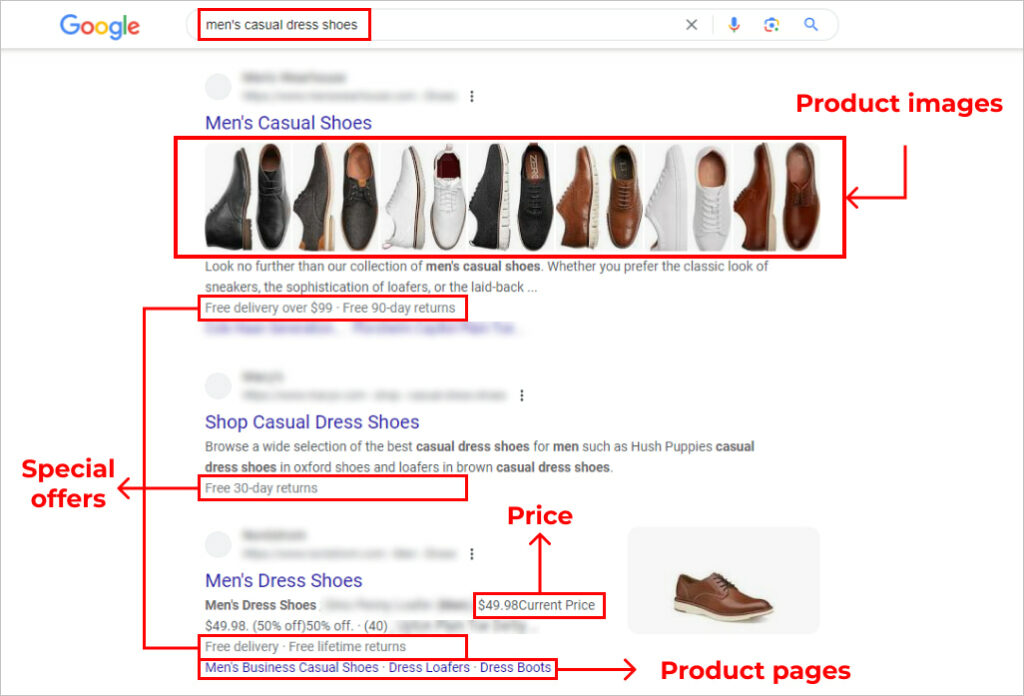
Watch your competitors on Google and learn the strategies they implement
Once you have identified your competitors, you need to gather information about them. This information can include their products, prices, marketing strategies, and customer reviews. You can gather this information by visiting their websites, reading their social media posts, and talking to their customers.
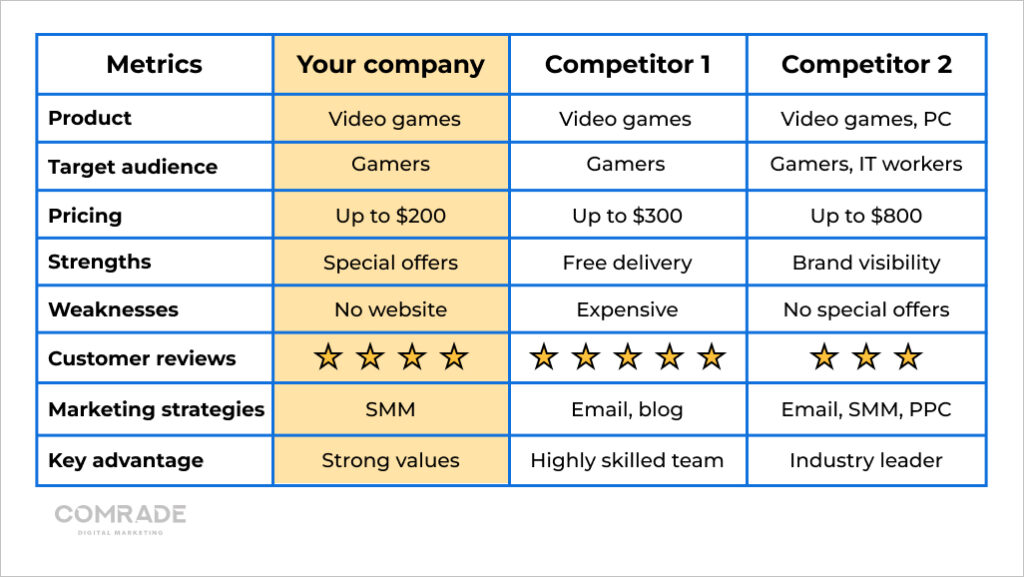
By the end of the research, create a table with the results
Once you have gathered information about your competitors, you need to analyze it. This means identifying their strengths and weaknesses, and determining how they are positioned in the market. You can use this information to develop a competitive advantage for your own business.
Competition research can be a time-consuming process, but it’s worth the effort.
4. Determine Your Target Audience
Once you’ve identified your business area of interest and have developed an eCommerce business plan, you’ll need to establish your target audience. Don’t skip this step and go straight to manufacturing! You must know who will buy your products before you begin.
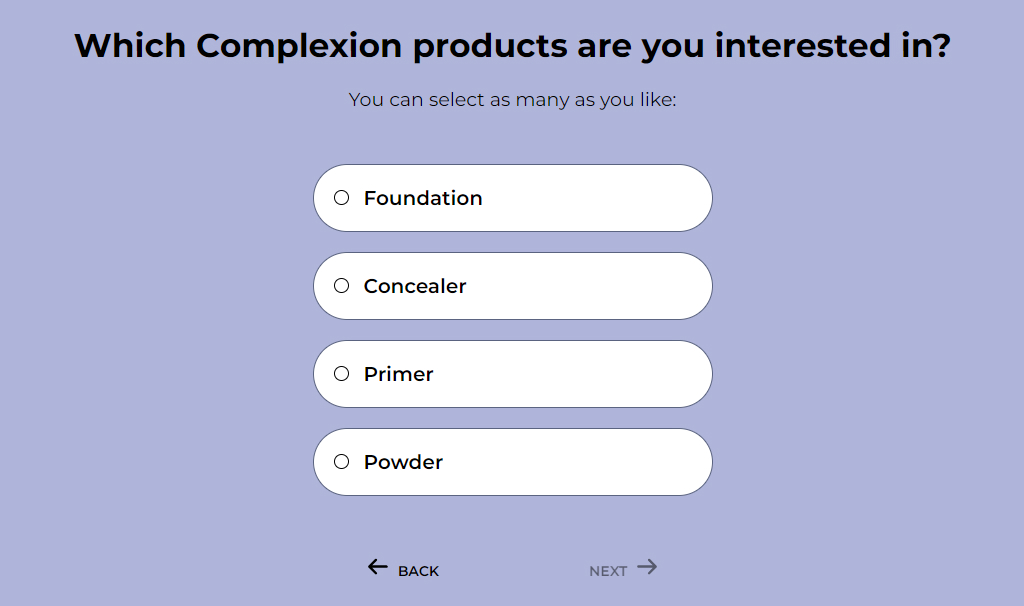
Surveys on your eCommerce website are a perfect way to gather data about your clients’ preferences
Think about your business name and its brand identity. If you were to imagine your ideal client, what type of person comes to mind? The voice of your brand, its mission, aesthetics, and message should represent the brand you’re trying to build.
After you’ve developed a target audience portrait, you’ll want to test your products. We advise testing them out on small customer groups to determine how viable they are and where you can make improvements.
5. Budget and Resource Research
The next step is to assess your available resources. How much do you have to start an eCommerce business online? What unique skills do you contribute to your company? How much are start-up costs?
Things to consider include the price of the product and marketing costs, such as the creation of an SEO strategy packaging, shipping costs and insurance, business equipment, business licenses, and the cost of employees.
Don’t forget the initial costs associated with eCommerce platforms, as well as maintenance. If you’re a small eCommerce business, you might be able to get away with a simple plug-and-play platform, however, if you have loads of product pages and want to ship internationally, you’ll probably need to hire professional web developers.
6. Decide on a Business Model for Your Online Store
An ecommerce business model is a framework that describes how your business creates, delivers, and captures value. It is an essential part of any business, but it is especially important for eCommerce businesses.
There are many different variations of an ecommerce business model, so you need to choose one that is right for your business. Some common business models for ecommerce businesses include:
- Retailer. You buy products from a wholesaler or manufacturer and sell them to online shoppers.
- Dropshipper. You don’t own any inventory. When a customer places an order, you place the order with a wholesaler or manufacturer and they ship the product directly to the customer.
- Affiliate marketer. You promote other people’s products or services and earn a commission for each sale that you generate.
7. Develop a Business Plan for Your Ecommerce Store
A business plan is a written document that describes your business goals and strategies, and how you plan to achieve them. It is an essential tool for any business, but it is especially important for eCommerce businesses.
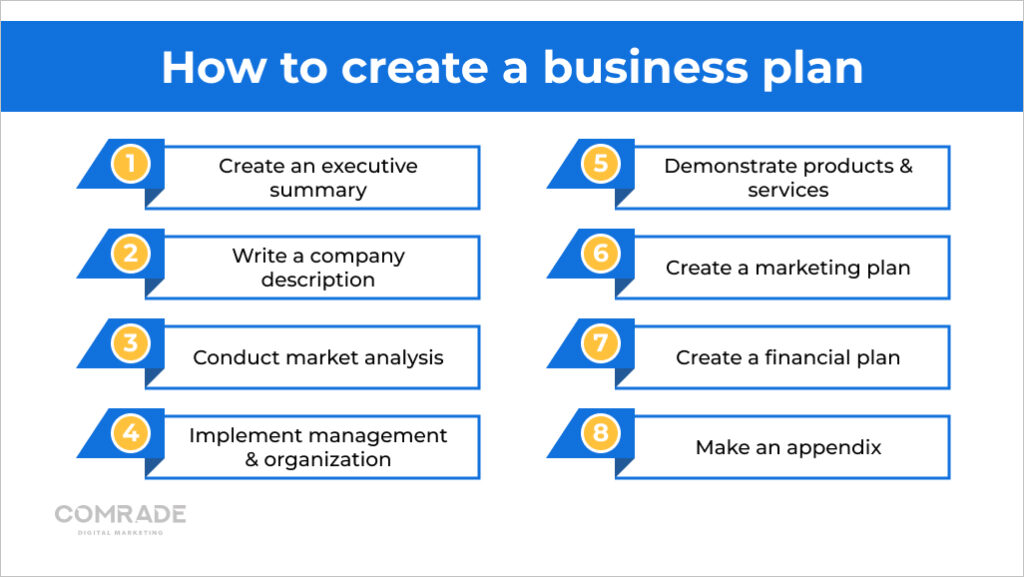
The main steps in the creation of a business plan
Here are the main steps on how to develop a business plan for your eCommerce business:
- Executive summary. The executive summary is a brief overview of your business eCommerce plan.
- Company description. The company description should provide a detailed overview of your business. It should include your business name, address, phone number, website, and contact information. It should also include a description of your products or services, your target market, and your competitive advantage.
- Products and services. The products and services section should provide a detailed description of the products or services that you offer. It should include information about the features and benefits of your products or services, as well as your pricing strategy.
- Market analysis. The market analysis section should provide an overview of the market for your products or services. It should include information about the size of the market, the growth rate of the market, and the major players in the market.
- Marketing plan. The marketing plan should provide a detailed overview of how you plan to reach your target market. It should include information about your marketing goals, strategies, and tactics.
- Financial plan. The financial plan should provide a detailed overview of your business’s financial situation. It should include information about your revenue, expenses, and cash flow.
- Appendix. The appendix should include any supporting documents that are not included in the body of the business plan. This could include financial statements, marketing materials, or product brochures.
Business plans work well when you need to step aside and see the big picture, that’s why it’s worth investing your time to create a really thorough plan.
How to Crush Ecommerce Business Competition
In 2023, eCommerce sales are projected to total 22.3% of all retail sales, which provides hope for those launching new businesses. Due to the user-friendly nature and availability of eCommerce software, you can start an online store for as little as $100.
However, there are an estimated 12-24 million eCommerce sites across the world, making online ventures exceptionally competitive. Successfully penetrating an over-saturated market demands rigorous market research to assess the viability of your proposition and know how best to position your brand within the market.
Ecommerce digital marketing plays an instrumental role in brand building and advertising. The right marketing strategy can grip your target market’s attention, ignite curiosity and convert website visitors into lifelong customers.
Drawing from our extensive experience of over a decade in the digital marketing landscape, where we have assisted numerous clients in surpassing their competition and achieving their business objectives, we have compiled together some valuable tips for your online selling journey.
Choose the Right Ecommerce Platform
The type of platform your eCommerce website is built on will impact business development. Because eCommerce is growing in popularity, you’ll discover you have numerous platforms, each with unique features that must be carefully considered.
When selecting the right platform for your own eCommerce store, consider size, scalability, and the specific requirements of your store. We’ve listed some of the most well-known eCommerce platforms in the table below.
Shopify

Copyrights an eCommerce website’s footer
Shopify is among the most popular e-Commerce platforms, and with good reason. It is an excellent option for entrepreneurs who are just starting out due to its simplified digital marketing capabilities. The platform offers great personalization, as well as the ability to manage and keep track of orders, and much more.
Magento

Copyrights on an eCommerce website’s footer
Magento also provides a high degree of customization for your brand store, as well as more advanced SEO tools and impressive scalability. It’s free to download and is well-known in the eCommerce industry for its compatibility with third-party integrations. You can visit our Magento development services page to learn more.
WooCommerce
WooCommerce is an open-source, flexible platform that was designed especially for WordPress websites. The plugin is available cost-free; however, using it requires other upfront costs associated with hosting, acquiring a domain, and other features. Visit our WooCommerce development services page to learn more.
BigCommerce
BigCommerce is a great platform for companies looking to scale as quickly as possible. It is popular for its powerful recovery of abandoned shopping carts and top marketing tools.
PrestaShop
This free, open-source eCommerce platform runs on cloud-based technology. It offers self-hosting and can is easily altered to suit your company’s needs.
Remember, selecting the best platform is an essential decision for your business, whether you sell your own products or someone else’s. Each platform has its pros and cons.
Before you start an eCommerce business, you should do the necessary research to ensure the platform has all the online services you need.
Choose the Right Marketing Strategy to Boost Sales
Both eCommerce businesses, big and small, require a strategic marketing strategy to connect with the right customers at the right moment.
Having a solid marketing plan with clear key performance indicators will help you create a profitable business. It’s also beneficial to hire an in-house marketing specialist or outsource your marketing needs to a professional agency, as they will be able to effectively market your eCommerce store.

When planning your budget, accommodate business growth and create a strong team who are committed to selling products and to your company’s success. Try not to hire too many employees at once. You want to outsource as much work as possible while maintaining a small internal team.
Lastly, a strategic plan for sales will allow your commerce business to stay on the right track and meet targets throughout the process.
And remember, building loyal relationships with customers is key to developing a loyal fan base. An eCommerce store that communicates with customers regularly in a positive manner will experience more customer purchases.
Furthermore, it is through the interactions you have with customers that you can learn more about their behavior as consumers. The results of these conversations will help you attract more customers who are like them.
Investing in Digital Marketing Is Vital
Digital marketing is a prerequisite for a successful eCommerce business. Marketing strategies that convert are built on analytics gathered from your target market’s online behavior. Today’s digital marketing delivers impressive ROI because it’s backed by data.
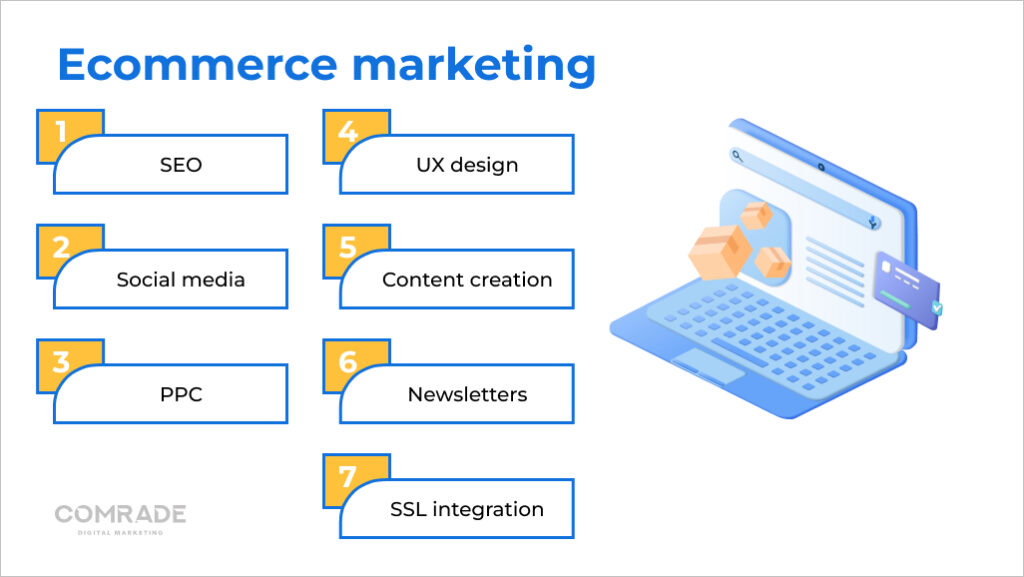
The main eCommerce marketing components
There’s no guessing, and with real-time feedback, campaigns can be optimized at any moment to improve conversions. Customers interact with brands across various touch-points, and digital marketing allows you to meaningfully connect with them wherever they are—whether it’s via email, search engines, or social media.
Search engines are fueled by user queries. Therefore, everything about your eCommerce store, from your website’s copy to your pay-per-click advertising, must be SEO-friendly (optimized) to match your customer’s queries and drive more traffic to your store.
After all, there’s no point in having an online business no one knows about. SEO builds long-term equity for your eCommerce business, elevating your brand’s profile on search engine results pages and cultivating fruitful customer relationships through consistent content marketing.
However, this type of digital marketing success is seldom achieved without a team of specialists skilled in SEO, UX design, content creation, PPC, and campaign management. An eCommerce marketing strategy needs a multidisciplinary approach provided by a seasoned digital marketing agency.
Ultimately, it’s easier to hire a marketing agency that can fast-track the process and boost your sales.
Don’t Forget about Your Ecommerce Blog!
70% of people would rather get information from a blog post than a professional advertisement. Blogs are content marketing gold because they provide customers with valuable information while building your brand’s visibility and credibility, and keeping your online store fresh with new content.

Pay attention to your blog’s categories; they can help you determine your target audience
Search engine and social media platform algorithms favor consistency. If you regularly post high-quality content and your audience engages with it, they’re more likely to show your posts at the top of followers’ feeds and search engine results pages.
Regular content creation informs Google, and other search engines, that your website is actively updated and therefore warrants frequent checking to see what new content has surfaced for indexing.
Once you’ve posted a blog on your website, don’t stop there! Make sure to distribute your content on social media. This strengthens your audience reach, helps your brand get found, and drives new website visitors back to your blog; your website should be meticulously designed for conversions.
Turn to Three Simple Letters: S and E and O — SEO
We’re constantly speaking about search engine optimization (SEO), and we know we sound like a stuck record, but the truth is the strength of your SEO strategy dictates your eCommerce success.
SEO determines how well your commerce business ranks on Google and other search engines. It’s in your business interests to always rank as high as possible in organic searches as this will improve your click-through rates.
Like marketing, SEO is also a broad term encompassing several components that should be part of your marketing strategy:
- On-page SEO—Publishing high-quality content and optimizing web copy, headlines, HTML tags, videos, and images.
- Off-page SEO—Techniques implemented outside your website, like link building, to improve the position of your business in SERPs.
- Technical SEO—Ensuring your website is free from technical errors that prevent search engines from crawling and indexing its pages.
- Local SEO—Improving your site’s visibility in local search results.
SEO is one of the few online marketing strategies that pay dividends over time. Traffic from optimized content will snowball, whereas pay-per-click advertising needs continuous funding to send traffic to your online store.
Patience Is Necessary for Success
According to Google’s webmasters, it can take your business between 18-24 months to see results from its SEO strategy, especially if you start an eCommerce business venture that doesn’t already have a brick-and-mortar store. SEO requires a lot of observation and data collection from analytics to optimize your online presence.
Several factors influence results: SEO keyword difficulty, competition, inbound links, and domain age. Therefore, SEO can take a longer or shorter time to work depending on your business’s position in the market, the industry in general, and search engine algorithm changes.
Additionally, it takes time for search engines to recognize your SEO campaign implementation. This is because they compare your content to other websites competing in the same space and assess over 200 factors to determine your website’s authority.
Don’t be dismayed by the wait. It’s industry standard and to be expected. The key is to lay a strong SEO foundation, so you’re ready to scale the moment the time is right. And remember, while SEO is an investment that requires ongoing maintenance, it works 24/7 for your business.
SEO’s cumulative nature provides lasting value. No amount of paid advertising can beat a top-ranking spot on Google search results pages and the unlimited traffic and revenue it brings.

How to Start an Ecommerce Business from Scratch with a Team of Professional Ecommerce Developers
Ensuring your eCommerce store is a success requires patience and dedication, as well having as a clear and concise vision. Setting up an eCommerce store on your own can be challenging, particularly if you’re doing it for the first time.
Our team at Comrade Digital Marketing Company has spent many years working with eCommerce businesses to help them sell online. From marketing tactics like search engine optimization to pay-pay-per-click advertising, we provide business ideas that grow revenue!
We offer an eCommerce marketing analysis at no cost because every so often you need help but don’t know where to start! We invite you to contact us to discuss your eCommerce website needs.
Frequently Asked Questions
Where do you operate?
Comrade originates in Chicago, but we worked all around the United States. We can help your business grow and increase revenue whenever you are. We have offices across most major cities in the US. For example, we can offer digital marketing services in New Orleans or Minneapolis. You can even find our internet marketing experts in Washington D.C.! If you want to know more about our Cleveland digital marketing agency or find out how exactly we can help you, contact us via the phone or email.





